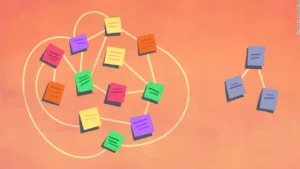Matthew Dicks's Blog, page 88
May 18, 2023
Lucky to be alive now?
To be alive right nowThese same lines are repeated later in “That Would Be Enough” when Eliza is trying to convince Hamilton to remain at home for the birth of their first child.These lines have always struck me as sounding a little crazy.Lucky to be alive in the eighteenth century?Admittedly, 1776 is a time of enormous social upheaval, stunning political reform, and unfathomable military victories against the most powerful empire in the world. But it’s also a world plagued by slavery, disease, infant mortality, widespread illiteracy, rampant poverty, a lack of economic mobility, and so much more.No electricity. No refrigeration. Limited climate control. No forms of rapid transit or communication. Limited medical knowledge or interventions. Limited access to books and other sources of information.And for women like the Schuyler sisters, their options were exceedingly limited. They couldn’t attend college. Couldn’t hold political office. Couldn’t vote. Couldn’t divorce their husbands. Couldn’t pursue careers in chosen fields. Maternal morbidity rates were astronomical by today’s standards.The eighteenth century sounds pretty miserable from my modern perspective.What a terrible time to be alive.Those lyrics felt especially relevant in light of the events of yesterday. Over the course of the day, I spoke to clients and business partners via Zoom in eight different cities on three different continents, including:Madrid, Spain
Melbourne, Australia
Ontario, Canada
San Fransisco, California
Bogata, Columbia
New York, New YorkKillington, Vermont
Los Angeles, CaliforniaI also used WhatsApp to communicate with a business partner in Isreal, and I used email to communicate with people in Washington, New Jersey, Pittsburgh, and Dallas, along with a number of people in Connecticut and Massachusetts.This doesn’t even begin to address the tens of thousands of people who read the blog post I’d written and posted before sunrise and the numerous text messages sent to people around the country.By the end of the day, after I’d spoken to my last client in Melbourne, I found myself thinking about how lucky I’m alive now, to be able to work with people around the world with such ease and speed.But then I remembered the Schuyler sisters, singing about the wonders of 1776, and thought:A century or two in the future, someone may read these words and think, “Lucky to be alive in 2023? What was that fool thinking? The twenty-first century sounds horrendous.”Our modern technological marvels will likely seem like hammers and chisels to someone in the future.Who knows what the next two hundred years may bring? Like the human beings alive in 1776, the people alive today can’t begin to imagine what the world will look like in 2223. My journey around the world via a computer screen may appear quaint and silly to the people of the future. It may strike them as ridiculously limited and exceptionally inefficient.Probably so.The Schuyler sisters, if they were indeed feeling lucky about being alive in 1776, were likely feeling no different than how many of us feel today. Lucky to be alive in a world that strikes us as technologically advanced, when in truth, we are probably occupying a future generation’s version of the Dark Ages.Unless, of course, climate change, artificial intelligence, self-serving politicians, or alien invasion ravage our world, turning the planet into an unrecognizable hellscape.In that case, maybe I am lucky to be alive now before all hell breaks loose.

May 17, 2023
Incrementalism may save your life… or at least prolong it.
Just 11 minutes of moderate-to-vigorous intensity aerobic activity per day could lower your risk of cancer, cardiovascular disease, or premature death, a large new study has found and was recently published in the British Journal of Sports Medicine.
Eleven minutes is nothing. It’s less than one percent of your day.
And this is a no-joke study.
Scientists from the University of Cambridge in the United Kingdom looked at data from 196 studies, amounting to more than 30 million adult participants who were followed for ten years on average.
People who exercised 75 minutes per week, or 11 minutes per day, enjoyed a 23% lower risk of early death.
Double that number to 22 minutes per day – still less than one percent of your day – and the results are even more extraordinary:
A 31% lower risk of dying from any cause, a 29% lower risk of dying from cardiovascular disease, and a 15% lower risk of dying from cancer.
All of those potential benefits for committing less than one percent of your day to exercise.
Astounding.
I argue in my book, “Someday Is Today,” as well as constantly aloud to anyone who will listen, in support of incrementalism:
The belief that small changes made over long stretches of time produce extraordinary results.
While incrementalism is real and exceeding powerful, many people reject it as truth because they cannot see the results immediately. Rather than exercising vigorously for 11 or 22 minutes per day, people would rather join a gym, hire a trainer, purchase a Peleton, train for a marathon, purchase a new wardrobe from Lululemon, research the just-right headband, and more.
But jogging around the block for 11 minutes would also do the trick.
Riding a bike down the street for six minutes and then turning back would produce the desired results.
Dancing in the kitchen to four Springsteen songs – “Dancing in the Dark,” “Hungry Heart,” “Rosalita,” and “Glory Days” – would also get the job done.
Actually, “Dancing in the Dark” and “Rosalita” alone clock in at just over 11 minutes, but it’s Springsteen.
Why stop at just two?
In all three cases, the exercise admittedly needs to be vigorous. You need to increase your heart rate to produce the results. But jogging, biking, and even dancing can all easily raise your heart rate to the desired level.
Just imagine:
Less than one percent of your day can lower your risk of ceasing to exist by as much as 31%.
You’d be crazy not to do this if you aren’t exercising already.
Right?

May 16, 2023
I do housework
Data from Pew indicates that in heterosexual households where both husband and wife are working an equal number of hours, women are doing 3,5 more hours of housework per week compared to their male counterparts.
In response to these findings, David Allen of CNN recommends the Post-It Challenge, wherein you and your spouse use Post-it notes to write down everything each of you is responsible for at home.
Chores. Childcare. Pets. Maintenance and repairs. Food preparation.
Everything.
In doing so with his wife, Allen discovered that he was woefully inadequate in his share of household chores.
I think this is a ridiculous idea.
Well, I guess it’s not ridiculous if you have no fundamental understanding of how a household runs. If you somehow believe that food arrives on the table via magic, doctor’s appointments are scheduled via osmosis, children are arriving at their soccer games via teleportation, the bed is made every day by the pillow fairy, and the pets are feeding themselves, then perhaps this challenge is for you.
But seriously? Is it really so hard to take a moment and reflect on what you are doing in comparison to your spouse?
Are people so obtuse as not to see the work accomplished, the effort put forth, and the chores still undone?
Allen claims that “So much of the work of running a household goes unsaid or is intangible.”
Unsaid? Sure. Maybe your spouse is suffering in silence.
But intangible?
Give me a break. It doesn’t take much to look around and ask yourself:
Who took out the trash?
Who signs all of the permission slips?
Who sweeps this floor?
Who helps with the homework?
Who drove the kids to soccer practice?
Who made dinner?
Who put food in the refrigerator?
Who scheduled the dentist appointments?
Who ordered the dress for the recital?
Who makes sure that the garage is closed every night?
Who called the plumber?
Who called the doctor to order the kid’s prescription?
Who washed the clothing?
Who folded the clothing?
Who reminded the children to brush their damn teeth?
Who cleaned out the garage?
Who cleaned out the garage again?
Who is exchanging text messages with the teacher?
Who is making sure that the kids’ clothing still fits?
Who is ordering bathing suits in May in preparation for June?
Who is preparing the tax returns?
Who is planning the summer vacation?
Who is filling out the medical forms for summer camp?
Who makes the bed every day?
Who stores the winter coats and boots at the end of winter?
Who plans Thanksgiving?
I could go on.
Do we really need to create a Post-It Note challenge to wake people up and take a look around?
I think the imbalance between men and women in the average heterosexual household is unconscionable, but I don’t think Post-It notes are required to see and understand this imbalance.
If your wife is doing an additional three hours of chores each week compared to you, the evidence of this imbalance is all around you. It’s as clear as day if you just take a moment and look.
Last night, I told Elysha about the findings from Pew and Allen’s Post-It challenge and asked her if she thought our chore ratio was balanced.
Her first response:
“Those women don’t have a husband who gets out of bed before 5:00 every day.”
Funny, and sure, it plays a role of sorts, but when I asked her to seriously reflect on the question, she came to the same determination as me:
Our balance is usually close to even.
But over this past year, as she has been engaged in an intensive certification program that will allow her to teach English language learners, I’ve been doing more of the household chores in order to make things work.
In our household, the numbers are often even but are currently reversed, with the male counterpart doing more. Once her program ends in June, I expect our balance to return to something closer to even.
I’m sure she does, too.
But here’s the thing:
We both knew this. It wasn’t a mystery that required Post-It Notes to discern. We both know how a household is run. We know what is required to keep a home clean, stocked, and well-maintained. We know what is needed to keep the children alive, educated, happy, disciplined, and hygienically acceptable to the world. We understand what our pets require on a daily basis.
We didn’t need paper, pen, and adhesive to see this.
If your spouse is doing 3.5 hours of additional household chores than you, I think you could see this disparity pretty clearly if you just gave the issue a medium of thought. A hint of consideration. An ounce of concern.
This is not a Post-It note situation. This is an “open your eyes and recognize reality” moment.

May 15, 2023
Early rising company
Around 6:30 AM on Mother’s Day, my sister, Kelli, sent me some photos of my mother that I had never seen before.
My mother passed away in 2007, so a new photo is such a blessing given I have so few.
I was so grateful and expressed as much.
I’m glad,” she responded. “I’ve been going through all the old pictures today.”
Today.
The first photo arrived at 5:52 AM.
It’s so good to have fellow early risers in your life. People who you can send a text message at 5:00 AM and receive a reply. I have a few of those people in my life:
My sister. A couple of friends.
They understand the glories of an early morning. The stillness of the street. The sound of birdsong outside the window. The transformation from darkness to the warm glow of early morning light.
As Kelli sorted through photos, I folded a load of laundry. Emptied the dishwasher. Fed the cats. Placed a Stop & Shop order. Wrote half a chapter of my book. Done pushups and situps.
Early mornings are glorious but can sometimes feel lonely.
Not so much when you know someone else is awake in the world, doing stuff, too.

May 14, 2023
Happy Mother’s Day. And don’t you dare say anything else.
Happy Mother’s Day to mothers everywhere.
Please remember, mothers, that there’s an apostrophe in Mother’s Day, meaning it’s your day. Don’t let anyone else’s expectations interfere with your desire to do whatever the hell you want today.
It’s your day, damn it.
Also, let’s celebrate it.
A friend and mother recently tweeted:
“Ok! All set on articles trying to make me feel bad about looking forward to Mother’s Day! Quota filled!”
She is, of course, referencing the annual inundation of pieces complaining about Mother’s Day for a variety of reasons, ranging from its commercialization to the shift from its historical origins to its “awkward sappiness” and sentimentality.
There are complaints from “child-free women” who view Mother’s Day as an indictment of their decision not to have children. There are people who have lost their mothers or lost children who complain that Mother’s Day is a difficult reminder of their loss. There are women who oppose Mother’s Day on feminist grounds. There are people who deride Mother’s Day as a “Hallmark Holiday” (which it’s not).
To all of these people, I have two words for you:
Shut up.
If you find yourself opposing Mother’s Day for any reason this year, please heed this advice:
Every thing is not a thing.
If your plan is to spend the day explaining how the origins of Mother’s Day have been twisted and perverted so badly that its original founder actually opposed the holiday in its present form and tried to have it rescinded, SHUT UP. There have been a million zillion articles already written about Anna Jarvis and her issues with Mother’s Day, and there is a fairly extensive Wikipedia page about Jarvis, her mother, and the history of Mother’s Day as well.
We got it.
If your plan is to complain about the billions of dollars spent on Mother’s Day, please stop saying boring things. We are consumers, too. We see the displays in stores. We hear the commercials on television. We spend the money, too.
We got it.
Whatever your reason for complaint, please do us all a favor and silence yourself today. The vast majority of us don’t want to hear it. Today is a day that we honor all of the sacrifices that mothers make in order to ensure that their children live safe, productive, happy lives, regardless of the history of the holiday or personal circumstances or the needs of feminism.
Even someone like me, who lost his mother far too early in life and struggles at times through Mother’s Day, recognizes the value of Mother’s Day.
Before you decide to raise your hackles and start complaining about Mother’s Day or anything else. please say this to yourself:
Every thing is not a thing.
Mother’s Day is not a thing. It’s not a cause or an antagonist or an issue in need of opposition.
It’s a lovely holiday spent honoring the mothers of the world.
There are far too many things deserving of your self-righteous indignation and derision.
This is not one of them.

May 13, 2023
Party favors on the decline
I’m happy to report that according to data from The Knot, the number of couples giving wedding favors to their guests is down 21 percent over the past five years.
Many couples are reportedly opting out of favors amid concerns about sustainability and in an effort to rein in costs.
I support this trend. I have attended many weddings over the years. Received many favors from those weddings.
I don’t think I own a single one today.
I’d also like to see this trend proliferate into the world of children’s birthday parties. The amount of needless waste in a gift bag at a child’s birthday party is astounding.
One person is supposed to receive gifts at a birthday party:
The child celebrating their birthday.
The rest of the children receive a slice of cake, a scoop of ice cream, and amusement of some kind.
They should be exceedingly pleased with this arrangement.
They do not need plastic doodads, paper trinkets, and confectionary sugar in the shape of African megafauna.
Enough is enough.

May 12, 2023
He blew a bubble
My mother didn’t allow my siblings and me to chew gum as children, so I never developed any affection for gum chewing later in life. Still, for all of my life, I have tried to blow a bubble with gum to no effect.
Then Charlie walks up to me before a baseball game last week, and midsentence, he blew a bubble. Casually. Like blowing a bubble was as ordinary as walking or breathing or leaving a pair of his damn shoes behind in every room of the house.
“How did you do that?: I asked. “Where do you learn to do that? Where did you get that gum?”
The gum came from a friend. He figured out how to blow a bubble on his own. He explained the process for blowing a bubble in the same way everyone prior to him has tried to explain it to me.
In other words, he wasn’t any help.
I should be proud of my son to have figured out something that has stymied me for all of my life.
I was not proud. Only annoyed.
How dare he betray me like this.
Flaunt a skill that I do not possess.
Look so effortless and cool while doing so.
It’s petty and stupid for me to be annoyed.
Still, I’m annoyed.

May 11, 2023
Wise phone
Our daughter, Clara, will be entering high school next year.
Alas, it will be time to get her a phone.
Not only will she need to be able to stay in better contact with friends, but she may actually need a phone at times in class.
After years of denying her this privilege (which has been exceptionally easy, both because we do what we believe is right and because Clara has never expressed much desire for a phone), it’s time to take that leap forward into technological connection.
What I discovered this weekend, however, is that phone technology has advanced considerably over the years. Limiting your child’s use of the phone turns out to be exceptionally simple, which makes me wonder why the hell more parents aren’t doing this already.
For example, it’s simple to prevent any apps from being installed on Clara’s future phone, including (and especially) social media.
There is also functionality that will allow Elysha and me to see every message that Clara sends and receives via our own phones.
Even better, and perhaps less privacy-invasive, AI-powered apps exist that monitor every bit of text inputted and received by a phone and will alert parents if something suspicious, sketchy, or otherwise nonpreferred is sent or received.
No need to relentlessly spy on your child. Allow artificial intelligence to do it for you.
We can also schedule her phone to shut off at a particular time every day, thus turning it into a brick for as long as we deem appropriate. The parents with whom I was speaking schedule their daughter’s phone to shut down at 8:00 PM every night and turn back on at 8:00 AM every morning, absent any effort on their part and thus ensuring their daughter a drama-free, technology-free beginning and end of her day.
I had no idea that all of these capabilities (and more) exist, mostly because I watch children spend hours staring at TikTok and Instagram or listening to them tell me about group chats with friends that keep them awake until well after midnight.
If the ability to monitor and limit phone usage exists, why aren’t more parents using them?
Congress is considering legislation to ban children under 13 from social media and require parental permission for children 13-17 to use social media. It would also prevent companies from using the data from children to market products and services to them.
The surgeon general has recently, belatedly advised parents to keep children off social media until the age of 13.
That strikes me as far too young. When Clara receives her phone this summer, she will not be allowed to access social media, and she will most assuredly be better for it.
But at least the legislation that Congress is considering and what the surgeon general has decreed is a start. With childhood anxiety off the charts and focus and attention plummeting, the very last thing we need to do is immerse a child into the realm of social media or allow them unfettered, unmonitored access to the internet or even their friends via their phone at all hours of the day.
Thankfully, all of the functionality required to prevent these things already exist, yet as far as I can tell, a small fraction of parents are using them.
Simply put:
What the hell?
Why are not more parents protecting their children from the excesses of the smartphone? Though I still worry about giving Clara a phone in her freshman year of high school, I feel much better about it after having learned about the controls at my fingertips.
And if those controls are still not enough for you, there is also the Wisephone, a brilliantly designed device that affords users only six functionalities:
Clock, calculator, maps, camera, texting, and phone.
No social media. No mind-numbing, time-wasting games. No apps. No access to the internet.
It sounds like something few people would ever want, yet the makers of Wisephone can’t keep up with demand. It’s perpetually out of stock as the company struggles to meet demand.
And it’s not children for whom this phone is most often being purchased. It’s adults who want freedom from the endless distraction, mindless nonsense, and unfettered access to their phones.
I’m thrilled to hear that adults are pushing back on the demands and distractions of their phones, but I wish parents would do the same for their children. As someone who spends enormous amounts of time with young people – both as a teacher and the parent of children – I witness the impacts of unmonitored, unlimited phone access on a daily basis.
It’s not good.
In the long term, I suspect that it’s going to be exceptionally bad.
This weekend, I discovered that my phone (and yours) already has the tools to protect our children from the hazards of social media, the internet, and constant connectivity.
It turns out, to my surprise, that the phone is not the biggest problem in this equation.
It’s parents.
May 10, 2023
Hilarity works
Numlock News is a daily newsletter by Walt Hickey that highlights the context and importance of the numbers you read about in the news.
I read it every day.
Not only does it teach me about the world, but it’s often amusing, too.
Sometimes hilarious in a surprising and comic way, like this entry, which I will allow you to read and enjoy without any preamble except to say that one of the best ways to convey information in a meaningful and memorable way is to also make it funny.
Humor is a powerful tool when deployed well. Hickey is particularly masterful in this particular case:
Viewers
A prominent cosplay event got 14 million viewers on the BBC this weekend, as a decent chunk of the country tuned in to watch the Archbishop of Canterbury announce in an elaborate costumed ceremony that a wealthy septuagenarian who is king still very much continues to be king. Much like when Disney puts new skin on tired old animatronics in an archaic attraction, this resulted in a brief surge of interest in the country. The event, sort of an elaborate Make-A-Wish thing put on by the landed gentry of the previously globe-spanning but today barely even European island, was put on for the benefit of a guy named Charles. The man, who until recently was more closely linked to Wales, is best known to a global audience as a relative of the acclaimed New York Times bestselling author Harry Windsor of California. The most acute ramification is that none of the British people I know will be at work tomorrow, not because of some kind of wildcat general strike in enlightened defiance of the disgraceful notion that anyone is born inherently better than anyone else, but because the new boss gave them the day.

May 9, 2023
“To each their own”
While discussing our appreciation for certain books, I said to Clara, “To each his own.”
Her response:
“Yup. To each their own.”
See what she did?
She shifted the pronoun without thought, stripping the gender from my remark without even realizing it.
She did so automatically.
This is a big deal for some people. Gender-neutral pronouns, gender fluidity, transgender rights, and similar issues are a big deal in our country today. These subjects have upset a great number of people, in part because politicians of a particular stripe have weaponized them for political gain.
Absent any ideas or solutions with broad appeal, they instead use social issues to gain political traction.
When 95% of Americans support universal background checks for the purchase of firearms, 61% percent support a ban on assault weapons, and 62% believe that abortion should be legal, it’s hard to win elections opposing these positions unless you find some boogeyman to frighten your constituents.
And yes, some debate, like the fairest ways for transgender people to compete in sports, for example, is certainly reasonable, but for an unfortunate many, the mere existence of transgender people and the realities of gender fluidity are offensive.
These people are ignorant, small-minded, frightened by change, invested in buffet-styled religious dogma, trapped within tragically fixed mindsets, or sheep-like beings who are easily misled.
Maybe some combination of these things.
The good news:
The younger generations suffer from none of this nonsense.
In the same way that previous generations once rejected interracial marriage, same-sex marriage, school desegregation, sexual harassment legislation, financial independence for women, smoking bans in public spaces, mandatory seatbelt laws, and many other common-sense reforms, so, too, will this stupidity about gender go the way of the dinosaur.
Those who cannot see the light will eventually find themselves living on the margins, the member of an ever-shrinking minority, and someday, sooner than later, pariahs.
Possibly extinct.
It starts with people like Clara, who demonstrate respect for her fellow human beings by not placing one gender above another or even making gender relevant in conversations like the one we were having that day.
Eliminating the unnecessary reference to gender automatically, without even having to think about it.
That is real change, and it is coming.
It’s just annoying that so many fools are still standing in the way.





